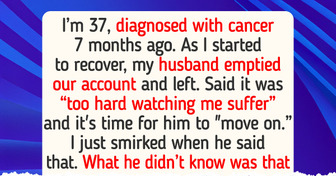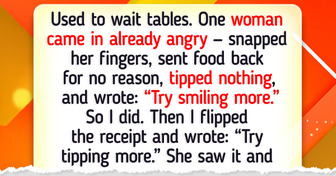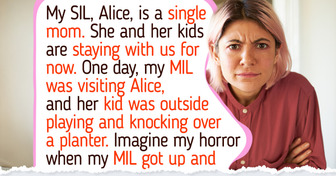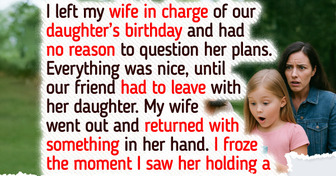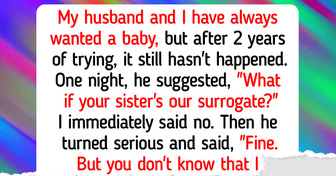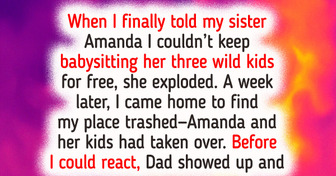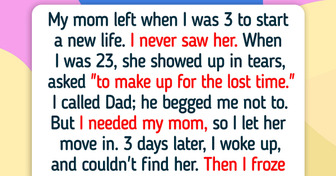I Forbade My MIL From Visiting My Kids After She Crossed the Line
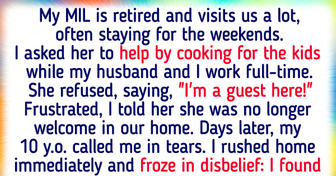
Bringing a new baby into the family is a joyful occasion filled with excitement and eager expectations. However, beyond the celebrations and nursery preparations, parenthood also brings profound changes to the couple’s relationship. It’s a true test of the strength and resilience of the partners’ connection. One of our readers decided to share a story about her son’s marriage, and what important lessons he learned...the hard way.

Hey, Bright Side! I’ve always liked your platform because it’s a place where people can share their thoughts openly. I’ve been part of discussions on your page before, giving advice and sharing my views on different stories. Now, I need some opinions from your audience about a situation. My son Jim said his wife, Lila, was wasting her potential after she chose to become a stay-at-home mom.
Michael married Lila in college. She was just as ambitious and intelligent, so they quickly bonded over their shared interests and similar personalities. After graduating, they both built successful careers and had a generally smooth relationship.
But everything changed six months ago after their child was born. The birth was tough, so Lila decided to quit her job and not return after maternity leave. She wanted to recover and spend more time with the baby.
My son stopped helping with household chores, arguing that if Lila wasn’t working, she had enough time to handle everything on her own, and he’s too tired from work to do anything else around the house. He called her lazy and decided to divorce her last year. Lila was devastated.
After the separation, Michael came to live with me. I felt really sad watching everything happen. I always tried to teach Michael about respect and empathy, but somehow he seemed to have forgotten those values.
I didn’t want to lose touch with Lila, so I called to see if I could come by. When I visited, I expected to console her, but instead, I discovered she’d been quietly building a small online business while running the entire household. It was thriving. She never told Jim because he’d stopped caring long ago, and she already felt like she was living alone.
As a woman, I stood with Lila. I didn’t just offer comfort. I decided to invest in her business. If my son couldn’t respect her, I would show her that someone else still did. When I told Jim about it, he went silent. I think, for the first time, he felt regret.
I told him the truth. I said I believed Lila won’t take him back, so he might as well use this opportunity to work on himself. And to become a better father for his child. Michael took my advice to heart. He reached out to Lila, expressing his deepest apologies and acknowledging his mistakes. They are not friends, sure, but they decided to try working on their relationship for the sake of their daughter.
Michael had learned a lesson he would never forget. But what do you think? Was I too harsh on my son?
You didn’t reject your son. In fact, you challenged his choices. That distinction matters. You showed him that love can still come with accountability, and sometimes that’s the most loving thing a parent can do. Taking a stand for Lila didn’t mean you loved Michael any less. It meant you expected more from him. And in the end, your honesty helped him reflect, grow, and try to reconnect with his own values.
Some situations don’t call for neutrality. You supported Lila not because you were choosing sides, but because you recognized someone who had been dismissed and devalued. Encouraging her dreams and validating her efforts wasn’t harsh; it was the right thing to do. Not to mention, you set a good example for your grandchild in the future. And by doing so, you gave both her and your son a chance to move forward in healthier, more honest ways.
Your words may have been hard for Michael to hear, but they were exactly what he needed. You didn’t punish him, there was no need to. He didn’t intend to hurt you with his decisions. The fact that he took your message to heart shows he was ready to learn, even if it came through pain.
If you’re still wondering whether you were too harsh, look at what happened. Your son apologized. Your daughter-in-law is thriving. And your granddaughter has parents working together for her well-being. That’s not the result of cruelty. That’s the result of someone brave enough to say, “This isn’t okay, and I believe you can do better.” And you did it with love.
Here’s another amazing, heartwarming story of a woman deciding to teach her son a lesson after he criticized his wife’s cooking, using a creative gift.


